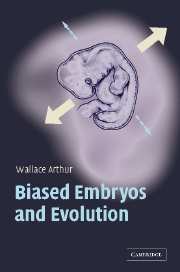Book contents
- Frontmatter
- Contents
- Preface
- Acknowledgements
- 1 The microscopic horse
- 2 What steers evolution?
- 3 Darwin: pluralism with a single core
- 4 How to build a body
- 5 A brief history of the last billion years
- 6 Preamble to the quiet revolution
- 7 The return of the organism
- 8 Possible creatures
- 9 The beginnings of bias
- 10 A deceptively simple question
- 11 Development's twin arrows
- 12 Action and reaction
- 13 Evolvability: organisms in bits
- 14 Back to the trees
- 15 Stripes and spots
- 16 Towards ‘the inclusive synthesis’
- 17 Social creatures
- Glossary
- References
- Index
6 - Preamble to the quiet revolution
Published online by Cambridge University Press: 02 December 2009
- Frontmatter
- Contents
- Preface
- Acknowledgements
- 1 The microscopic horse
- 2 What steers evolution?
- 3 Darwin: pluralism with a single core
- 4 How to build a body
- 5 A brief history of the last billion years
- 6 Preamble to the quiet revolution
- 7 The return of the organism
- 8 Possible creatures
- 9 The beginnings of bias
- 10 A deceptively simple question
- 11 Development's twin arrows
- 12 Action and reaction
- 13 Evolvability: organisms in bits
- 14 Back to the trees
- 15 Stripes and spots
- 16 Towards ‘the inclusive synthesis’
- 17 Social creatures
- Glossary
- References
- Index
Summary
The starting point for my preamble to the book's core chapters (7–11) is an attempt to distinguish between different hierarchical levels in the battle against ignorance. At the most general level, all humans of goodwill are fighting this fight, whether by actions or by words. A student on a year out doing voluntary work in a deprived region of Africa is fighting ignorance regardless of whether he or she is teaching in a classroom or digging irrigation ditches. I make this point at the outset because I do not wish to be seen as proclaiming that academics have a monopoly in this particular battle. But having made it, I will indeed focus down one level in the hierarchy and restrict myself to the academic domain.
What is it that characterizes academic enquiry as a particular branch of the battle against ignorance? This is a remarkably difficult question to answer. The fact that I know this is one of the few benefits that derive from membership of high-level university committees. Across a university, academics study a wide range of disciplines: from art to philosophy, from business to biology. The ways in which they study may have some things in common, but in many inter-subject comparisons the differences are more conspicuous than the commonalities.
It is the ‘way’ or ‘method’ of study that distinguishes the scientific disciplines from others. Again, as we descend another level in the hierarchy, and so are faced with a choice, I will take the direction that leads to the domain about which I am better informed rather than the alternative one.
- Type
- Chapter
- Information
- Biased Embryos and Evolution , pp. 66 - 74Publisher: Cambridge University PressPrint publication year: 2004



